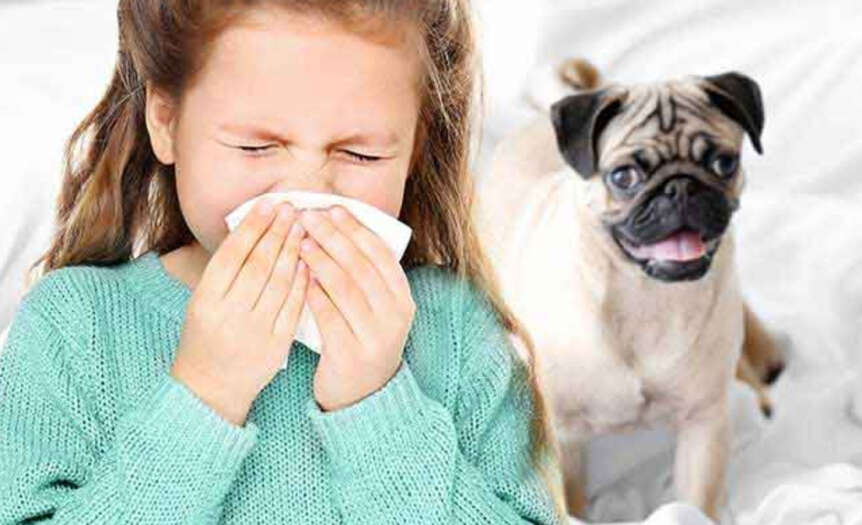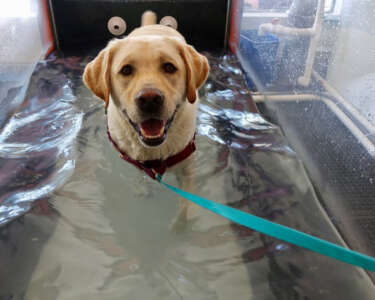If even the idea of playing with your dog or cat gives you a bad case of the sniffles, then you are not alone. You are among the 15% to 20% of pet owners that are allergic to their pets. Now, this does not mean that you have to give your best friend up. First, let’s understand what makes you allergic to your pets. Proteins found in your pet’s dead skin cells can trigger an allergic reaction, as well as proteins found in their saliva, urine and secretions from their skin’s sebaceous glands. The length or type of fur surprisingly does not influence the potential for a pet to cause allergies. It is a myth that there are hypoallergenic dogs or cats, since allergies are very particular for each individual. What induces allergies in you may not induce allergies in someone else.
A single person may be allergic to several things. For example, you may be allergic to your cat in addition to dust mites, molds, mango trees and even your favorite perfume. The severity of the symptoms will then depend on the cumulative effects of these allergens in your environment at a given time. For this reason, getting rid of your pet may help to some degree but may not solve the problem. Most importantly, before assuming that your pet is the cause of your allergies, go to a doctor specialized in allergies and get a proper diagnosis. If you have been diagnosed with allergies to your pet, here are a few tips to follow in order to live a happy, allergy-free life with your pet.
Decontaminate Your Home Environment
Create a pet-free room. This should be your bedroom since you spend at least five to eight hours every night sleeping in it. Limit the number of curtains and carpets; these are ideal places for allergens to accumulate. Vacuum frequently with a special filter to control allergens or use a vacuum with a disposable bag. Install room air purifiers with special filters to control environmental allergen particles. Use “low dust” cat litter and clean the cat box frequently.
Decontaminate Your Pet
Bathe your pet once a week to remove dead skin cells, dried saliva and other allergens from their coat. Brush their coat several times a week outside of the house. Wash their bedding in the washing machine weekly.
Protect Yourself
Assign a person in the family to decontaminate your pet and home. Avoid doing it yourself if you can. Wash your hands after touching your pet and avoid touching sensitive areas like your eyes, nose and mouth. Set up an outfit for playing with your pet to avoid contaminating all your clothes. Finally, find an allergy specialist to help you set up a therapy plan that hopefully will not require getting rid of your best friend. After all, we are all in this together. Many veterinarians are allergic to animals, and many pets are allergic to their humans. Finding a way to live in harmony is the goal.














 Deering Estate
Deering Estate
 Massage Envy South Miami
Massage Envy South Miami
 Calla Blow Dry
Calla Blow Dry
 My Derma Clinic
My Derma Clinic
 Sushi Maki
Sushi Maki
 Sports Grill
Sports Grill
 The Healthy Kitchen
The Healthy Kitchen
 Golden Rule Seafood
Golden Rule Seafood
 Malanga Cuban Café
Malanga Cuban Café

 Kathleen Ballard
Kathleen Ballard
 Panter, Panter & Sampedro
Panter, Panter & Sampedro
 Vintage Liquors
Vintage Liquors
 The Dog from Ipanema
The Dog from Ipanema
 Rubinstein Family Chiropractic
Rubinstein Family Chiropractic
 Your Pet’s Best
Your Pet’s Best
 Indigo Republic
Indigo Republic




 ATR Luxury Homes
ATR Luxury Homes


 2112 Design Studio
2112 Design Studio
 Hamilton Fox & Company
Hamilton Fox & Company
 Creative Design Services
Creative Design Services
 Best Pest Professionals
Best Pest Professionals
 HD Tree Services
HD Tree Services
 Trinity Air Conditioning Company
Trinity Air Conditioning Company
 Cisca Construction & Development
Cisca Construction & Development
 Mosquito Joe
Mosquito Joe
 Cutler Bay Solar Solutions
Cutler Bay Solar Solutions


 Miami Royal Ballet & Dance
Miami Royal Ballet & Dance
 Christopher Columbus
Christopher Columbus
 Pineview Preschools
Pineview Preschools
 Westminster
Westminster
 Carrollton
Carrollton
 Lil’ Jungle
Lil’ Jungle
 Frost Science Museum
Frost Science Museum
 Palmer Trinity School
Palmer Trinity School
 South Florida Music
South Florida Music
 Pinecrest Orthodontics
Pinecrest Orthodontics
 Dr. Bob Pediatric Dentist
Dr. Bob Pediatric Dentist
 d.pediatrics
d.pediatrics
 South Miami Women’s Health
South Miami Women’s Health

 The Spot Barbershop
The Spot Barbershop
 My Derma Clinic
My Derma Clinic




 Miami Dance Project
Miami Dance Project

 Rubinstein Family Chiropractic
Rubinstein Family Chiropractic
 Indigo Republic
Indigo Republic

 Safes Universe
Safes Universe
 Vintage Liquors
Vintage Liquors
 Evenings Delight
Evenings Delight





 Atchana’s Homegrown Thai
Atchana’s Homegrown Thai
 Baptist Health South Florida
Baptist Health South Florida

 Laser Eye Center of Miami
Laser Eye Center of Miami
 Visiting Angels
Visiting Angels
 OpusCare of South Florida
OpusCare of South Florida

 Your Pet’s Best
Your Pet’s Best





 HD Tree Services
HD Tree Services
 Hamilton Fox & Company
Hamilton Fox & Company


 Creative Design Services
Creative Design Services